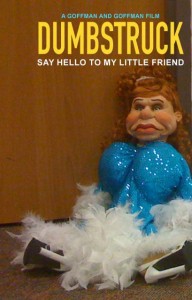Dumbstruck
Posted on April 21, 2011 at 6:00 pm
B+| Lowest Recommended Age: | 4th - 6th Grades |
| MPAA Rating: | Rated PG for brief suggestive humor |
| Profanity: | None |
| Alcohol/ Drugs: | References to substance abuse |
 Once a year, there is a gathering in Kentucky for people who “talk to themselves and play with dolls for a living” — ventriloquists. “Dumbstruck” is a documentary from Lindsay and Mark Goffman that follows five of them for the year between two of these Vent Haven ConVENTions in what turned out to be the biggest year in history for the tiny little community. One of its members unexpectedly hit the biggest of the big time when Terry Fator went from performing at county fairs to a $100 million headliner contract in Las Vegas after he won “America’s Got Talent.”
Once a year, there is a gathering in Kentucky for people who “talk to themselves and play with dolls for a living” — ventriloquists. “Dumbstruck” is a documentary from Lindsay and Mark Goffman that follows five of them for the year between two of these Vent Haven ConVENTions in what turned out to be the biggest year in history for the tiny little community. One of its members unexpectedly hit the biggest of the big time when Terry Fator went from performing at county fairs to a $100 million headliner contract in Las Vegas after he won “America’s Got Talent.”
For an enduringly popular style of performance, there’s a lot of hating on ventriloquists. Many people think of them as corny or annoying, just above mimes or strange, like the murderous ventriloquist characters played by Anthony Hopkins in “Magic” or Michael Redgrave in “Dead of Night.” When Fator walked on stage for the first time in “America’s Got Talent,” judge David Hasselhoff said, “Oh, no, a ventriloquist.”
But it is impossible not to fall in love with the characters in this film — the human ones, anyway — because it is more than an act from someone who might have just as easily chosen juggling. It is clear that these people become ventriloquists because they have things to say that they just do not feel comfortable saying any other way. I used to think that the reason ventriloquists argued with their characters was to enhance the audience’s perception that the puppet was a real character. But this movie makes it clear that the relationship — and that is truly the word that applies — between the person and the puppet is far deeper and more complex and intriguing, and the passion it requires is profoundly moving. All of us adopt personas for different situations; they just make it more explicit. The art is less about whether the lips move or the voice sounds different than it is about the ability to take a portion of what is inside them and create a complete character from it. After all, the most successful American ventriloquist of the 20th century, Edgar Bergen, performed on the radio.
This film has a former beauty queen, Kim Yeager, whose mother wistfully dreams that her daughter will give up ventriloquism and live a normal life. But Yeager is wholeheartedly committed, performing more than 400 shows in a year, many of them safety demonstrations for schoolchildren. In one of the movie’s most intriguing scenes, she gets some advice from a consultant on her act and ends up completely re-thinking her main character. Then there’s Dan Horn, who was at what used to be considered the height of success for a ventriloquist. He spends most of his time on the lucrative cruise ship bookings. But the long separations are very hard on him and his family. We learn about Wilma Swartz from her nephew, who tells us that the rest of the family has abandoned her but that he is loyal to her because of her kindness to him when he had no one else. She is 6 feet 5 inches tall and one of her puppets is a life-size ostrich. And when she needs help, she finds that the ventriloquist community stands by her. Dylan Burdette is a white middle-schooler from rural Kentucky whose mystified parents are trying to understand why he wants to be a ventriloquist and why he insists on a dummy who is a black “pimp.” And there is Terry Fator, who as this movie was being filmed, became a superstar. He returns to Vent Haven as a homecoming hero, and the Goffmans show great sensitivity and understanding in portraying the mingled emotions of his fellow puppeteers as they share his triumph and wish some of it would rub off on them.
The Goffmans have a lot of affection for their characters, and by the end of the film, you will, too.
Parents should know that there is mild crude humor and references to family and marital stress, substance abuse, and separation and possible eviction.
Family discussion: Why is it easier for the ventriloquists to speak through their puppets? What do you want to do as badly as these people want to perform with dummies?
If you like this, try: “Spellbound” and “Worldplay”

Nell, great post … ill try Spellbound” and “Worldplay” for sure